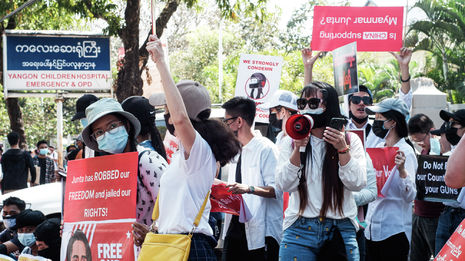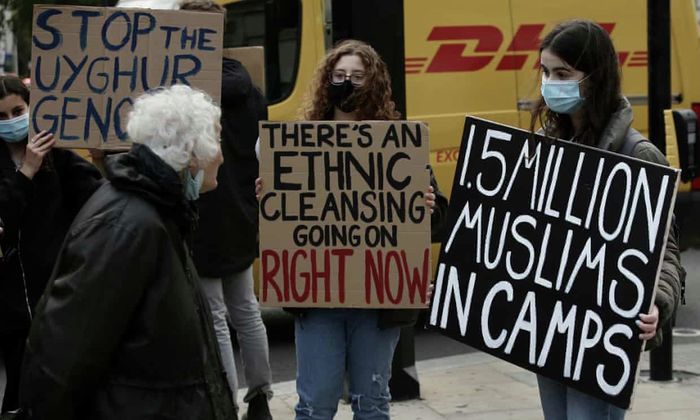“Come you back to Mandalay”: the Myanmar Coup and the west
Will Peet argues that the UK and other liberal democracies must take a much harsher line against regimes that seek to stifle human freedoms.

On the 1st February 2021, a cabal composed of senior members of the Tatmadaw – the Burmese military – overthrew the democratically elected ruling party, the National League for Democracy, along with its de facto leader, the iconic Aung San Suu Kyi. Despite ongoing clashes with pro-democracy protestors, with this coup, the Burmese military seems to have successfully regained power over a nation with an all-too-familiar history of stratocratic rule. The coup follows elections in November 2020, won in a landslide by the now-overthrown ruling party, which the military labelled as fraudulent. What should have marked a continuation of the democratic rule installed in 2015 may now regrettably mark the conclusion of a brief tryst with democracy.
This coup represents a somewhat predictable process of democratic backsliding in the Southeast Asian nation. Even with the ostensible end of military rule in 2015, the constitutional arrangements put in place, written by the military, dictated that a quarter of all seats in parliament would be guaranteed to military-chosen delegates. The new phase of the Burmese state thus rested on inherently shaky foundations.
Since then, the Burmese military has only grown in power and influence. It has remained a constant fixture of international news, due to its genocidal violence against the minority Muslim Rohingya community. Ethnic cleansing, which began in October 2016 and is still ongoing, has taken place largely unimpeded by a world community trapped by red tape and flawed United Nations multilateralism. Now facing a different crisis, there has nevertheless been a similarly derisible response promulgated by the international community.
Three weeks after the coup, civil defiance remains strong – clearly military rule is anathema to the people’s wishes. As recently as the 20th February, the BBC reported that 2 people were killed in protests. Actions undertaken by police forces have been labelled “deeply troubling” by the United States and ”beyond the pale" by British Foreign Secretary Dominic Raab.
“It is this marred history that should spur Britain to do more.”
This particular bout of protesting took place in the city of Mandalay, a place immortalised by poet Rudyard Kipling. The poem, written from the perspective of a British soldier stationed in the former British colony of Burma, implies a longing to return to an idyllic setting with its refrain, “come you back to Mandalay”. Today, it serves as a lyrical reminder of British colonialism in Southeast Asia. Indeed, Myanmar has been plagued by near perennial instability since its independence in 1948. Long periods of military rule have been common, with the military ruling more or less continuously from 1962 to 2015. The conditions that allowed such instability to rise were directs consequences of British colonialism in the region. It is this marred history that should spur Britain on to do more in response to current circumstances and to prevent a genocidal regime from consolidating power.
With these protests, a window of opportunity for international action has been opened. Predictably, responses thus far, whilst rhetorically condemnatory, have had little to no tangible impact. The United Nations has strongly condemned the detention of political leaders, and Boris Johnson has echoed such sentiments, insisting that “the vote of the people must be respected, and civilian leaders released”. However, such rhetoric is essentially meaningless if it does not translate into change on the ground.
Indeed, the London-based NGO, Burma Campaign UK, which aims to restore human rights and democracy in Myanmar, has derided British sanctions; measures taken against three Burmese military leaders on 18th February amounted to nothing more than a “holiday ban”. Sanctions which would really hurt the Burmese military regime would have to be imposed on military companies which generate millions of dollars a year for the regime. However, it is also clear that the United Nations is so tied down by geopolitical stalemate that it provides infertile ground for enacting meaningful change. A recent British-drafted resolution presented to the United Nations Human Rights Council may be adduced for this. The original, more damning resolution had to be watered down after vetoes from China and Russia. This truncated resolution has no power to impose sanctions: it is merely a whisper into the void.
“This truncated resolution has no power to impose sanctions: it is merely a whisper into the void.”
East Asia is already home to one genocidal regime, one that is so integrated into the world economy and political system that opponents dare not speak out against it. It would be a colossal tragedy if another were allowed to cement its position and gain international legitimacy. It is indicative of the futility of current international politicking that the United Nations has thus far been ineffective in dealing with events unfolding in Myanmar. By continuing to engage with what has become, in effect, a largely ceremonial international body, liberal democracies are participating in a hypocritical dialogue wherein they fail to stand up for the values they take for granted back home.
As we move towards a post-Covid-19 world, it is time for democrats to start living up to their virtues. Does Britain really want to cement its status as an active bystander, wilfully ignorant in order to propagate the international status quo? It is high time for Britain and liberal democracies the world over to live up to their creed and take a much harder line against regimes that seek to stifle human freedoms, even if that means bypassing the bureaucratic halls of the United Nations.
 News / Cambridge bus strikes continue into new year16 January 2026
News / Cambridge bus strikes continue into new year16 January 2026 News / Uni members slam ‘totalitarian’ recommendation to stop vet course 15 January 2026
News / Uni members slam ‘totalitarian’ recommendation to stop vet course 15 January 2026 Science / Why smart students keep failing to quit smoking15 January 2026
Science / Why smart students keep failing to quit smoking15 January 2026 Interviews / The Cambridge Cupid: what’s the secret to a great date?14 January 2026
Interviews / The Cambridge Cupid: what’s the secret to a great date?14 January 2026 Comment / Will the town and gown divide ever truly be resolved?12 January 2026
Comment / Will the town and gown divide ever truly be resolved?12 January 2026









